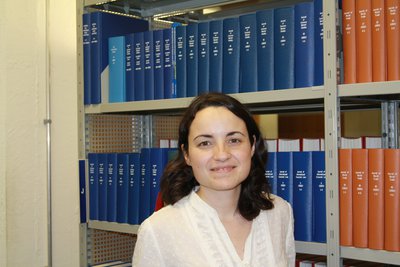27 Jun 2014
Visiting Fellows: Dr. Sofia Boza
Dr. Sofia Boza of the University of Chile has returned to the WTI where she spent several months in 2013 finding out more about the legal aspects of agriculture policy and trade issues as a researcher in the SECO-WTI academic partnership programme. Her current focus is on how WTO food safety and quality measures affect Chilean agricultural imports.
Welcome back! Apart from escaping winter in Chile, what are you hoping to achieve during your short visit to the WTI?
Thanks a lot. Well, on the one hand I would like to contribute to further strengthening the link between my institution, the University of Chile, and the World Trade Institute. On the other hand, at a personal level, last year when I was here I had excellent feedback on my research, so I want to repeat the experience now that I have made more progress in it.
Your current research is on the impact of WTO food safety and quality measures on Chilean agricultural exports. Can you tell us more about that?
Yes, of course, in fact I love talking about my research topic! Seriously, I am directing a project founded by the Vice-Presidency for Research and Development of the University of Chile. The proposal of this research project is to significantly contribute to the existing literature on the link between sanitary, phytosanitary and technical measures (SPS/TBT) and agri-food trade, with a special focus on the Chilean case, where although there have been major advances recently, there are still many facets to explore.
It’s your second time here as a visiting fellow. What for you are the benefits of conducting research here?
At a worldwide level there are not too many academic units so specialised in international trade as the WTI. Furthermore, I tend to work with economists and agronomists, so having the legal perspective on my research issue is very important to me. It is a way to harmonise my results with the actual operation of the multilateral system.
Tell us about your involvement with the SECO/WTI project.
Well, I started collaborating with Professor Dorotea López from the Institute of International Studies of the University of Chile two years ago. She is the head of the Chilean section of the SECO/WTI project, and she invited me to participate in the project by taking up my first fellowship at the WTI last year. After that, I also helped prepare the activities developed during the visits of WTI faculty members Dr. Christian Häberli and Dr. Arthur Appleton to Santiago.
Your work at the Dept. of Agricultural Economics at the University of Chile seems to be firmly rooted in the Chilean context. Can you tell us of any specific practical results your research has had?
Yes, the interest of doing this in Chile is because despite the importance of food and agricultural exports in the Chilean economic strategy – they represent more than half of Chile’s non-copper trade revenue – there is still little research examining the effects that sanitary, phytosanitary and technical standards could have on these trade flows, and only a small part of that has incorporated econometric methodologies.
The project, which will finish in March 2015, has already produced some interesting results that have been set out in different papers, conference presentations, lectures and theses, among others. In addition, we brought this topic to the attention of Chilean policy makers, professionals, students and the general public through two seminars that we organised last year with the FAO Regional Office for Latin America and the Caribbean in Santiago.


